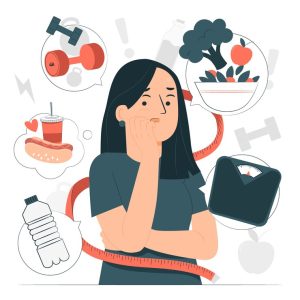
The Hidden Causes Of Eating Disorders: It’s Not What You Think
The world often sees eating disorders as just a food and weight issue. But for you, the one struggling, it’s likely way more complex. When

The world often sees eating disorders as just a food and weight issue. But for you, the one struggling, it’s likely way more complex. When

If you’re new to the term “emotional eating,” reflect on these questions below: Do you eat to feel better (to comfort yourself when feeling upset,

I feel so worried
I’m extremely sad today
I’m very very angry
A feeling is equal to some thoughts and a state of mind – is that it though? When you speak of sadness, anger, fear, despair what do you think these emotions really include? A lot of us mistakenly believe that emotions are just about some thoughts and the way one feels.
This understanding is hugely incomplete
Emotions have a big, big manifestation in the body too. In fact, the body is the seat of emotions.

The New Year has begun! Every new year brings along with it the vibe of a fresh start and of new beginnings. Perhaps, that’s how the whole idea of new year ‘resolutions’ came in. The philosophy behind resolutions seems to be to infuse us with freshness and zeal , to make one change that will see us being happier and healthier in the next year. Some of you may have made your resolutions and are probably trying to keep up with them. Many of us, throughout the year, attempt to form new habits or to break old ones. Both forming and breaking habits involve a whole lot of psychological connotations. For now, let’s pick one habit that many of us share a love-hate relationship with – a food habit. Just about any food habit. Be it a tendency to reach for the chocolate bars as soon as you reach home or munching on fries and wafers for hours together. The importance of eating healthy and caring about food habits stares us in the face everyday, through newspapers, the internet and somewhere, even through our own bodies. What does it take to break an unhealthy food habit? To deal with a craving for food? ‘Self-control’ is what intuitively comes to mind.

We specialize in combining psychotherapy with deep wellness practices like mindfulness and meditation and creating a customized mental health plan for individuals and organisations.
We specialize in combining psychotherapy with deep wellness practices like mindfulness and meditation and creating a customized mental health plan for individuals and organisations.

A young woman from another country moved with her family to live for one year in a town near the monastery. When, in the course of the year she discovered the monastery, she would periodically visit to have discussions with the Abbess. The Abbess introduced her to meditation, which became very meaningful for the young woman.
When the family’s year-long stay was drawing to an end, the young woman asked the Abbess, “In my country there is no Buddhism and no one has even heard about meditation. How can I continue to learn and deepen the practice you have started me on?”
The Abbess said, “When you return home ask far and wide for who, among the wise people, is recognized as having the greatest ability to listen. Ask that person to instruct you in the art of listening. What you learn about listening from such a person will teach you how to further your meditation practice.
― Gil Fronsdal, A Monastery Within: Tales from the Buddhist Path